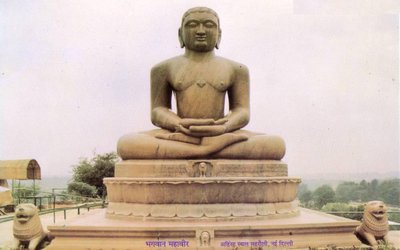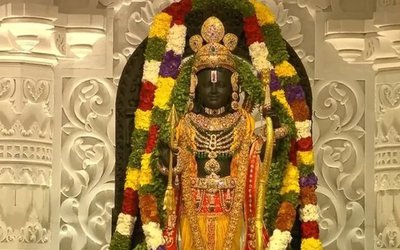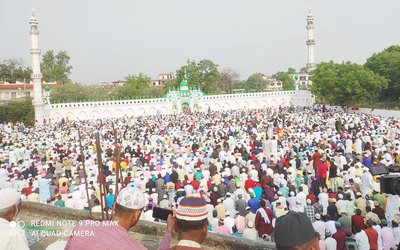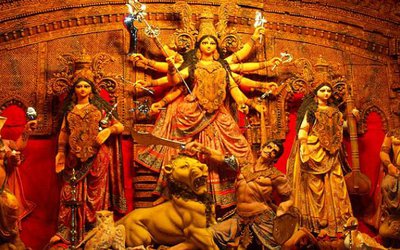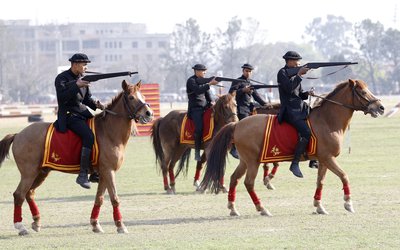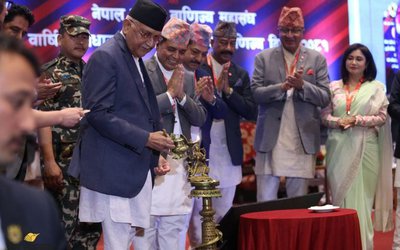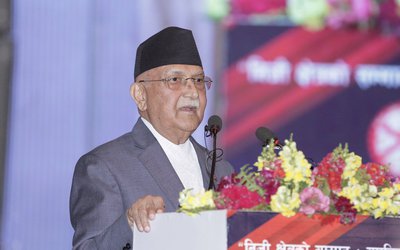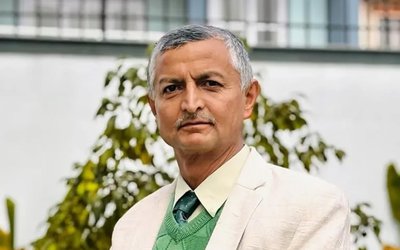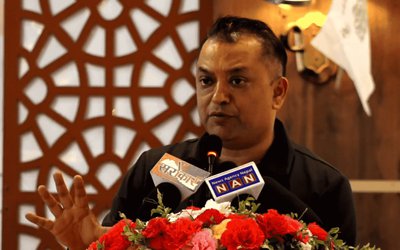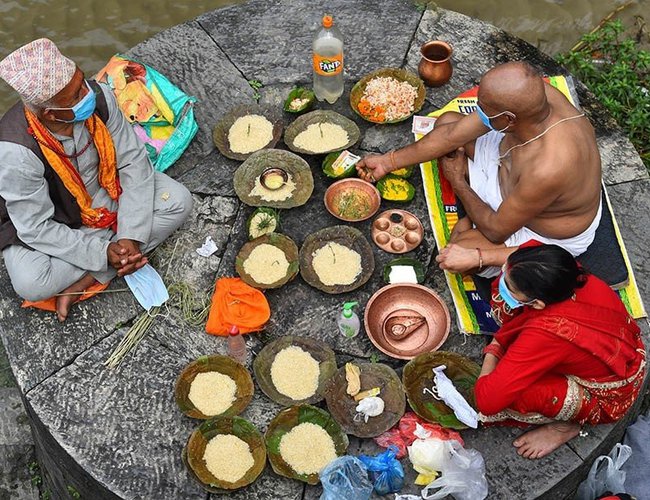
Sorha Sraddha or Pitru Pakchhya, a period of 15 lunar days during which Hindus pay homage to their ancestors, began on Saturday (September 30). This is widely observed in Hindus in Nepal and India and all over the world for fifteen days paying respect to ancestors.
Sorha Sraddha or Pitru Pakchhya falls in the lunar month of Bhadra (September-October), beginning with the full moon day and ending with the new moon day. According to Hindu mythology, Sraddha rites are performed and tarpan is offered to deceased family members across three generations, both patriarchal and matriarchal.
Sons offer pinda (ball of rice), fruits and flowers to their three generations. As the name suggests, Sorha Sraddha is observed for 16 days in memory of the deceased ancestors. Shraddha is performed at temples, river banks and homes with the help of priests. Hindus usually eat vegetarian food during this period.
Pitru Paksha is a period of 15 lunar days during which Hindus pay homage to their ancestors, especially through food offerings. It is only the nomenclature of the lunar months that differs, and both North and South Indians perform the Shraddha ritual on similar days.
The last day of Pitru Paksha is known as Sarvapitri Amavasya or Mahalaya Amavasya. Mahalaya Amavasya is the most important day of Pitru Paksha.
Why is Shraddha important?
The rite is performed for the deceased father, grandfather, and great-grandfather, as well as for the mother, grandmother, and great-grandmother. It is intended to nourish, protect, and assist the spirits of the deceased in their pilgrimage from the lower to the higher realms prior to their reincarnation and reappearance on earth. It is mandatory that the shraddha be performed by a son to ensure that the ancestor's soul goes to heaven. If the ancestors are satisfied with the shraddhas, they will bestow health, wealth, knowledge, longevity, and ultimately heaven and salvation upon the one who performs them.
According to Sanatan Dharma or Hindu religion, parents are the living God, so they should be respected before and after death. Shraddha should be performed twice a year, once on the lunar day of the parent's death and once on Sorha Shraddha.
During Shraddha, tarpan - the giving of water by joining the palms of both hands - should be given not only to the parents, but also to the three generations of ancestors.
The best place to perform Shraddha is the Gokarna temple; however, the bank of the Bagmati near Pashupatinath is also better. However, some people prefer to perform Shraddha at home.
During Sroha Shraddha, sons should be vegetarian and abstain from erotic relations. They must be prepared for Shraddha by shaving the head, cutting the nails and beard, and bathing.
According to Hindu tradition, it is obligatory to perform Shraddha. If one of the parents has no son, the grandson has to perform Shraddha, and if there is no grandson, the representative (adopted son) or the son of the deceased's brother has to perform the rituals. However, widows can perform Shraddha if there is no son.
The main purpose of Shraddha is to satisfy the deceased parents with various offerings. Therefore, there is no doubt to say that Sorha Shraddha or Shraddha is a ritual like a rope which helps to make close the relationship with the deceased parents.
The story of Sohra Shradhha is related to the fate of Karna who died in the epic Mahabharata. After his death, his soul ascended to heaven where he was offered gold and jewels as food. Karna was shocked and did not understand why he was not offered real food, so he asked Indra, the Lord of Heaven, why he was served gold instead of food. Indra told Karna that he had given gold all his life, but had never given food in the name of his ancestors.
Lord Indra
Unaware of this, Karna told Indra that he wanted to make amends. Indra agreed, and Karna was to return to earth for a period of 16 days so that he could perform the shraddha rituals and donate food and water. With this in mind, the practice of Sohra Shraddha has been passed down from generation to generation with its importance still intact.
What is the 15-day Shradh period?
Pitru Paksha occurs annually and spans a period of 15 days during which people typically visit the banks of the Ganges or other rivers to make offerings to their departed ancestors.
What Are the Three Types of Shradh?
There are distinctions among various types of Shraddha:
Nitya (नित्य) – Daily Shraddha is known as Nitya Shraddha.
Naimittika (नैमित्तिक) – Also called Ekodishta (एकोदिष्ट), it is performed for a specific individual.
Kamya (काम्य) – Conducted to fulfill special wishes.
What Is the 13-Day Period After Death?
The 13 days following a Hindu death are a time of mourning when the family of the deceased is considered impure. During this period, they follow several rules of behavior, including staying primarily at home and refraining from attending religious functions or celebrations.
What Are the 13-Day Rituals After Death?
On the 13th day of mourning, it is common for the grieving family to hold a ceremony (‘preta-karma’) to perform rituals that aid the soul of the deceased in reincarnation. Additionally, on the first anniversary of the death, a memorial event is hosted to honor the loved one’s life.
What Should Be Avoided During Shradh?
Engagements, weddings, and housewarming rituals should be avoided during this time. Consumption of non-vegetarian food, tobacco, and liquor should also be abstained from. Using iron utensils and cutting hair or shaving should also be avoided during these 15 days of Pitru Paksha.
Why Do We Cut Hair After Death?
It is believed that the act of cutting hair symbolizes the removal of ego, arrogance, and vanity. It is replaced with a sense of responsibility, positive energy, and humility. Additionally, it is seen as a gesture of grief and a mark of respect for the departed soul.
Can Daughters Perform Shradh?
Daughters, along with sons, grandsons, great-grandsons, wives, daughter’s sons, and others in the family lineage, can perform Shradh rituals for their ancestors.
Can Women Attend Shradh During Menstruation?
Hinduism does not impose restrictions on women participating in religious activities during menstruation. Such restrictions are often based on misconceptions.
Is Shradh Good or Bad?
Performing Shradh ceremonies is considered a compulsory duty in Hinduism. Failing to do so may result in pitru shaap or ancestral curses, which can bring bad luck, illnesses, and challenges to the family.
Can We Pray During Shradh?
During Shradh, Hindus offer prayers for the peaceful state of their deceased ancestors in the afterlife.
Which Pooja Is Done After Death?
Shanti path or moksha prapti pooja is a comprehensive ritual that involves Vedic mantras and donations performed according to the wishes of the family members, and it takes a significant amount of time when conducted authentically.
Dashain, the greatest festival of Hindus, starts after Sorha Sraddha is over.
- Efforts to reform the economy are positive, but not enough: Dhakal
- Apr 10, 2025
- Government committed to preventing deterioration of business environment: PM Oli
- Apr 10, 2025
- Teachers Are Protesting On The Streets Of Kathmandu
- Apr 10, 2025
- Senior Advocate Vijaya Prasad Mishra elected as Bar Association president
- Apr 10, 2025
- No Amount of Washing And Cleaning Can Turn Former King Gyanendra Shah Into A Constitutional Monarch: Gagan Thapa
- Apr 10, 2025
